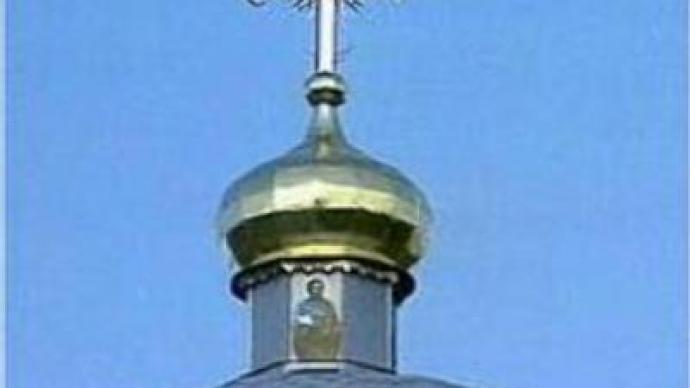Ukrainians divided by politics and religion

A political crisis, that has gripped Ukraine, is not the only issue which divides the country. The Ukrainian Orthodox Church is split up between a Moscow Patriarchy and a separate Kiev Patriarchy, which declared independence in 1991.
The Moscow and Kiev branches split apart in the 15th century. Yet only after Ukraine became independent from the Soviet Union, it was able to declare its church free as well. But up to the date it has not been recognized by the Eastern Orthodox communion.The Ukrainian Orthodox Church, Moscow Patriarchate, remains the largest single religious community in the country. The Church has about 9,500 registered communities, most of them located in the central, southern, and eastern parts of the country. It is headed by Metropolitan Volodymyr (Sabodan) of Kiev and All Ukraine.The Ukrainian Church has been headed since 1995 by Patriarch of Kiev and All Ukraine Filaret (Denisenko) once the Russian Orthodox Metropolitan of Kiev and all Ukraine. It has 3,000 registered parishes, approximately 60% of which are in the western part of the country.Church split provoked numerous conflicts at the local level. Militant supporters of the Ukrainian Church often violently evicted Moscow Patriarchy priests from churches. And the politicians used the conflict as an instrument of power.Father Oleg Sirko, Ukrainian Orthodox Church, Moscow Patriarchy, who had fallen victim of such an attack a couple of years ago, set up a tent in front of the Ukrainian Parliament, protesting against the eviction.“I went on a hunger strike when they tried to cease my church. They left but later returned, dragged me out and kept me in a ring for 9 hours. Then beat me up. Local authorities took the side of the Kiev Patriarchy and ordered to share the church with them. But my parish didn't want to share,” says Father Oleg Sirko.The church in the middle of the conflict is now occupied by the parish which aligns itself with the Kiev Patriarchy. They deny allegations that Father Oleg was violently evicted from this church.“We are Ukrainians and want to have services in Ukrainian, not Russian. We offered them an alternate use of the church. After all, two thirds of the village are Ukrainian Orthodox. He refused to do so and locked himself up there. We never beat him, it's a big lie. The councilor let us take the locks down and start using the church,” says Petro Volos, villager.“My mother died around this time and he didn't even allow us to ring the bells and bury her properly. I don't believe he was ever on hunger strike. I saw him eating jam and people feasting in the church,” says Galyna Mutryk, villager.Worshippers on the other side of the conflict refuse to share the church with other villagers.They pray in the house of Father Oleg as he tries to find justice in Kiev.
“They called him bad names. I saw them tying him up to the tree with chains as if he was an animal. If somebody in the village didn't like him and wanted a different priest, they could have appealed to the Synod. We sued them and won the court case but they refuse to give the church back. Village has split in two because of this. Some parents don't talk to their children. Brothers and sisters argue over this,” says Nina Kucyuk, villager.Experts on religious affairs say faith isn't the cause of this divide.“In Ukraine, it's the parish which decides what religious branch they want to belong to. Statistics show that there are 3 times more people who chose to align themselves with Kiev rather than with Moscow Patriarchy. Of course, the mother church that controlled Ukraine for centuries doesn't want to lose its integrity now. It's their way of influencing people to have support among the ex Soviet States,” says Oleksandr Sagan, expert on religious affairs.Long-standing dispute between the churches continues and the ordinary people have to deal with the results. Yet on the other hand, even at times of the worst political unrest, most people can draw a line between religion and politics.
You can share this story on social media:












